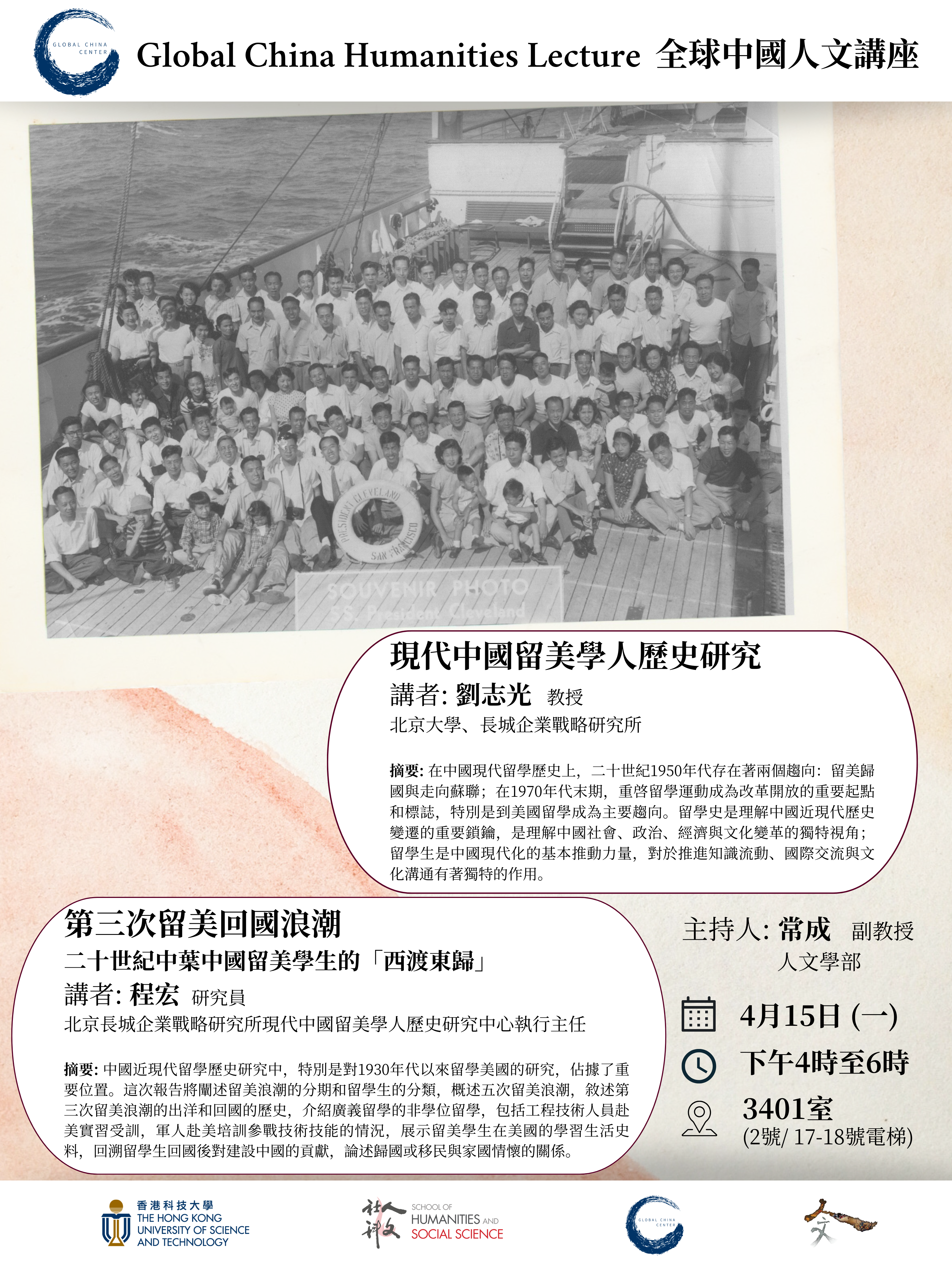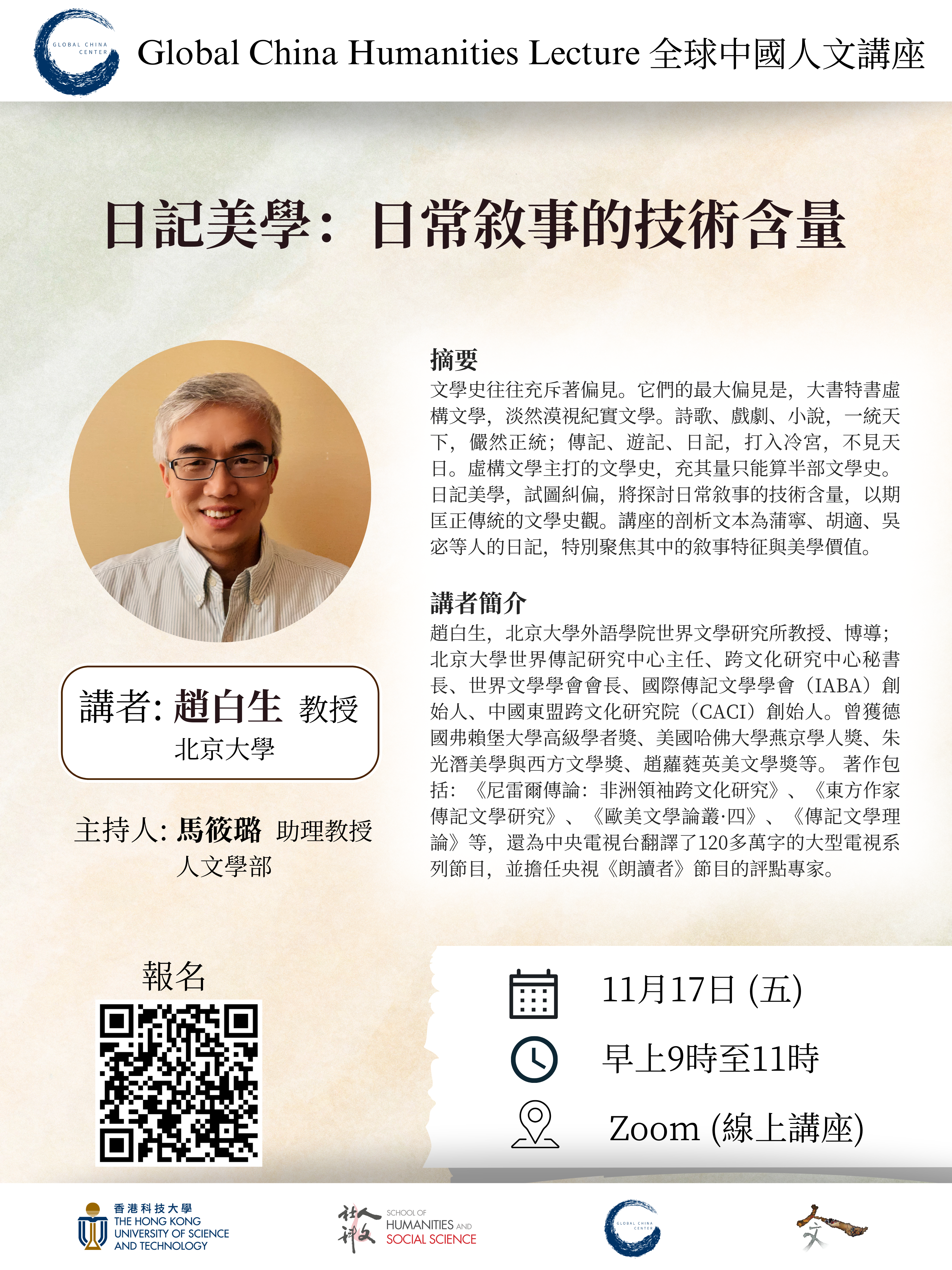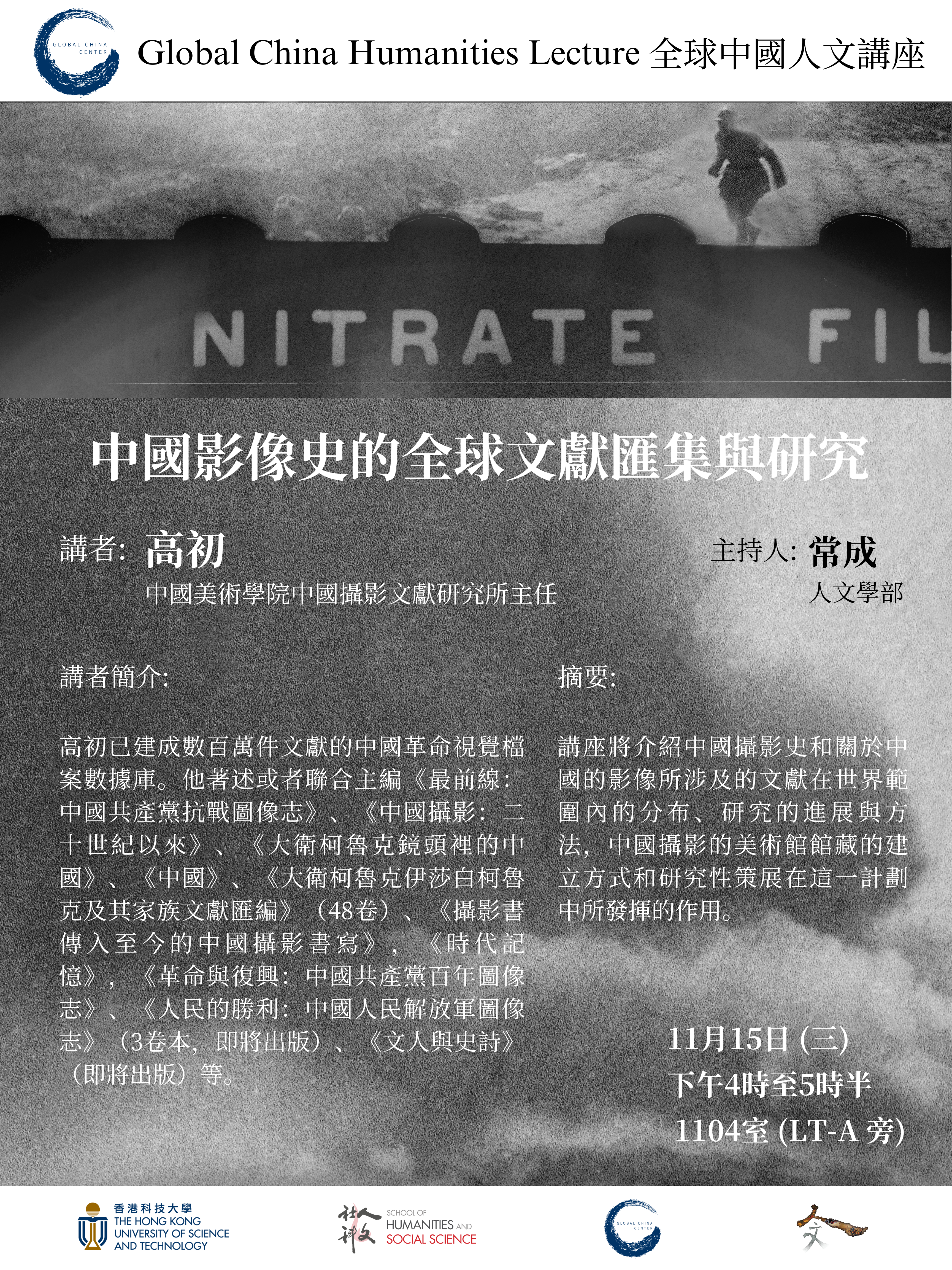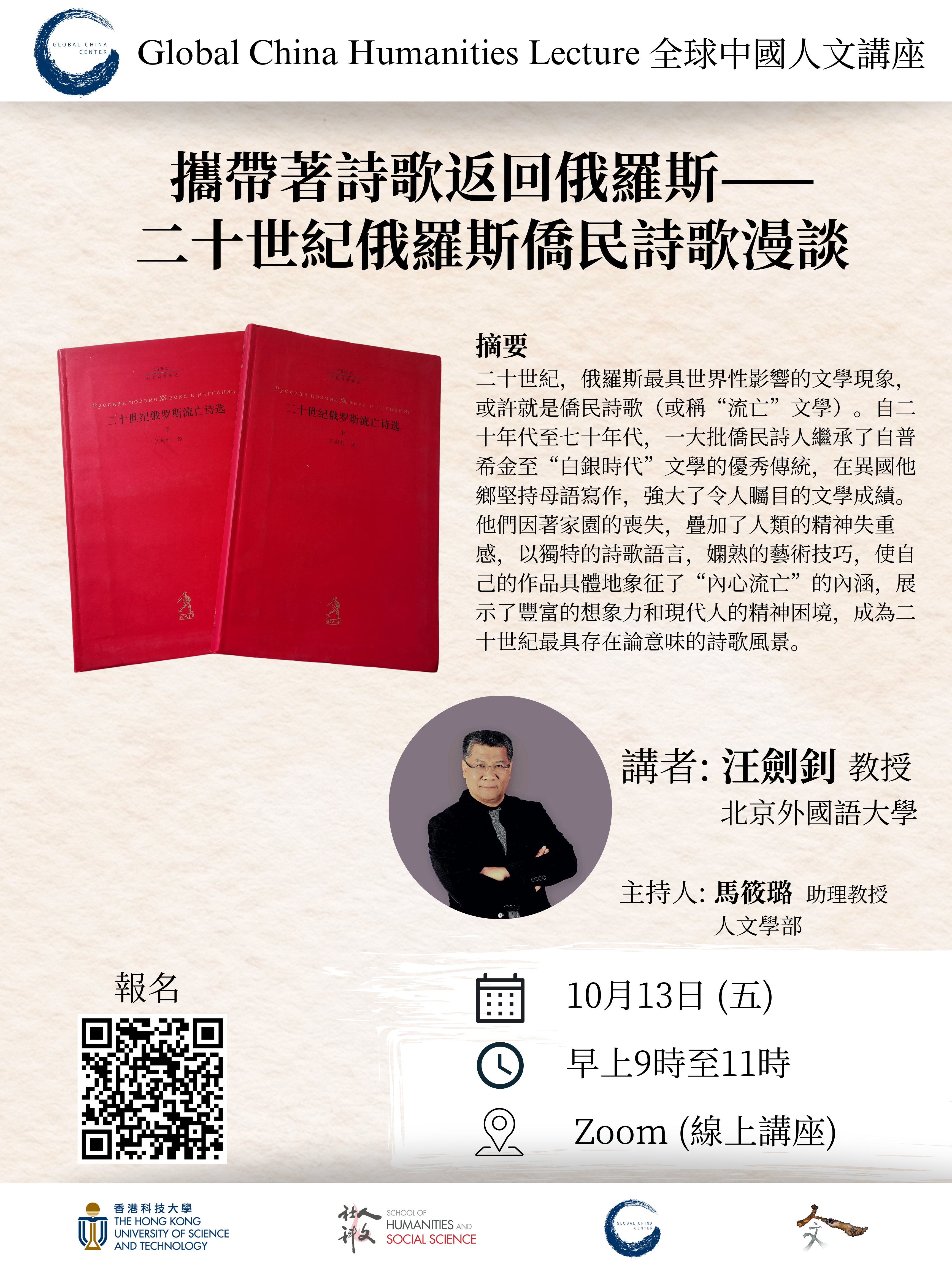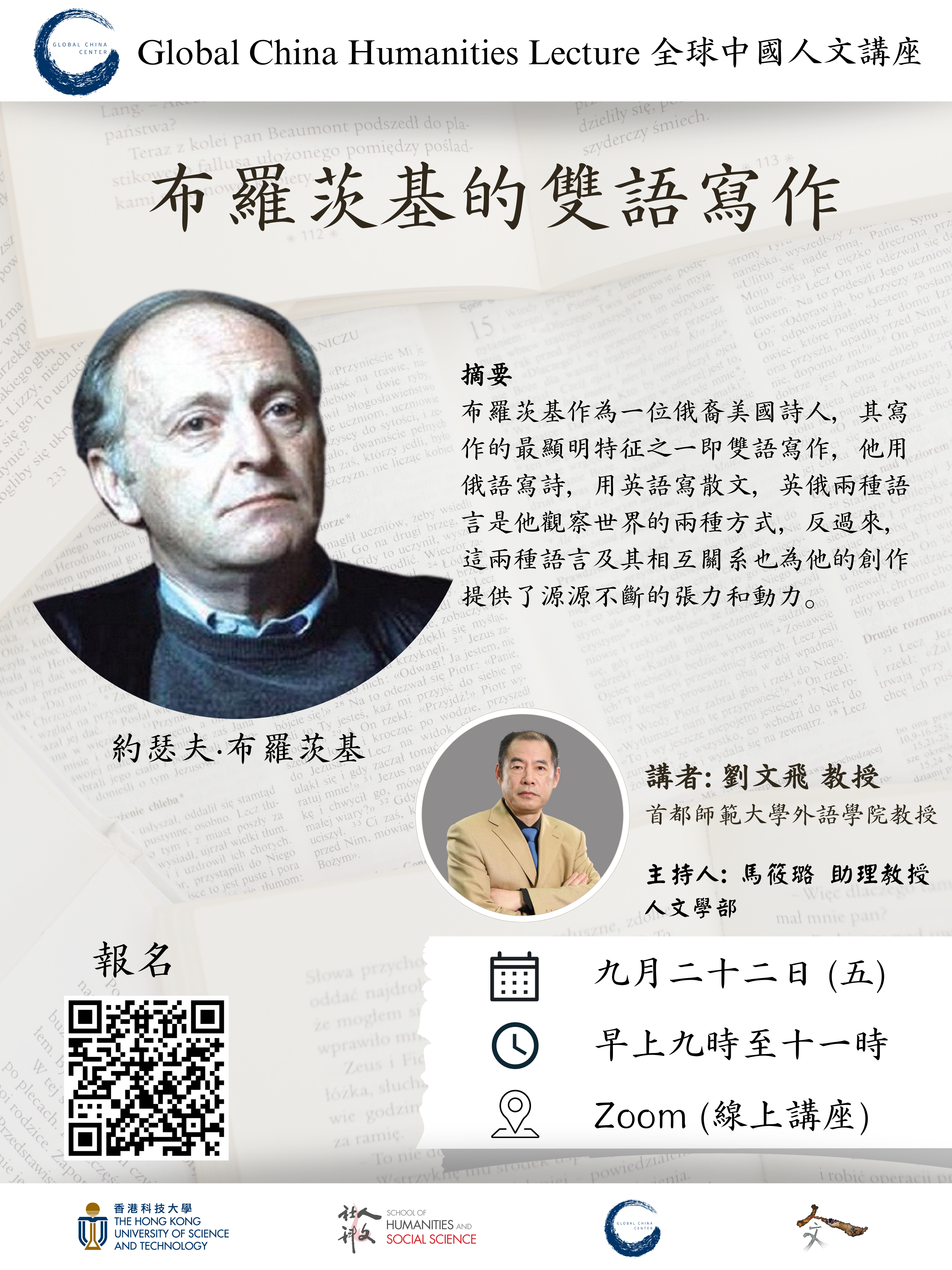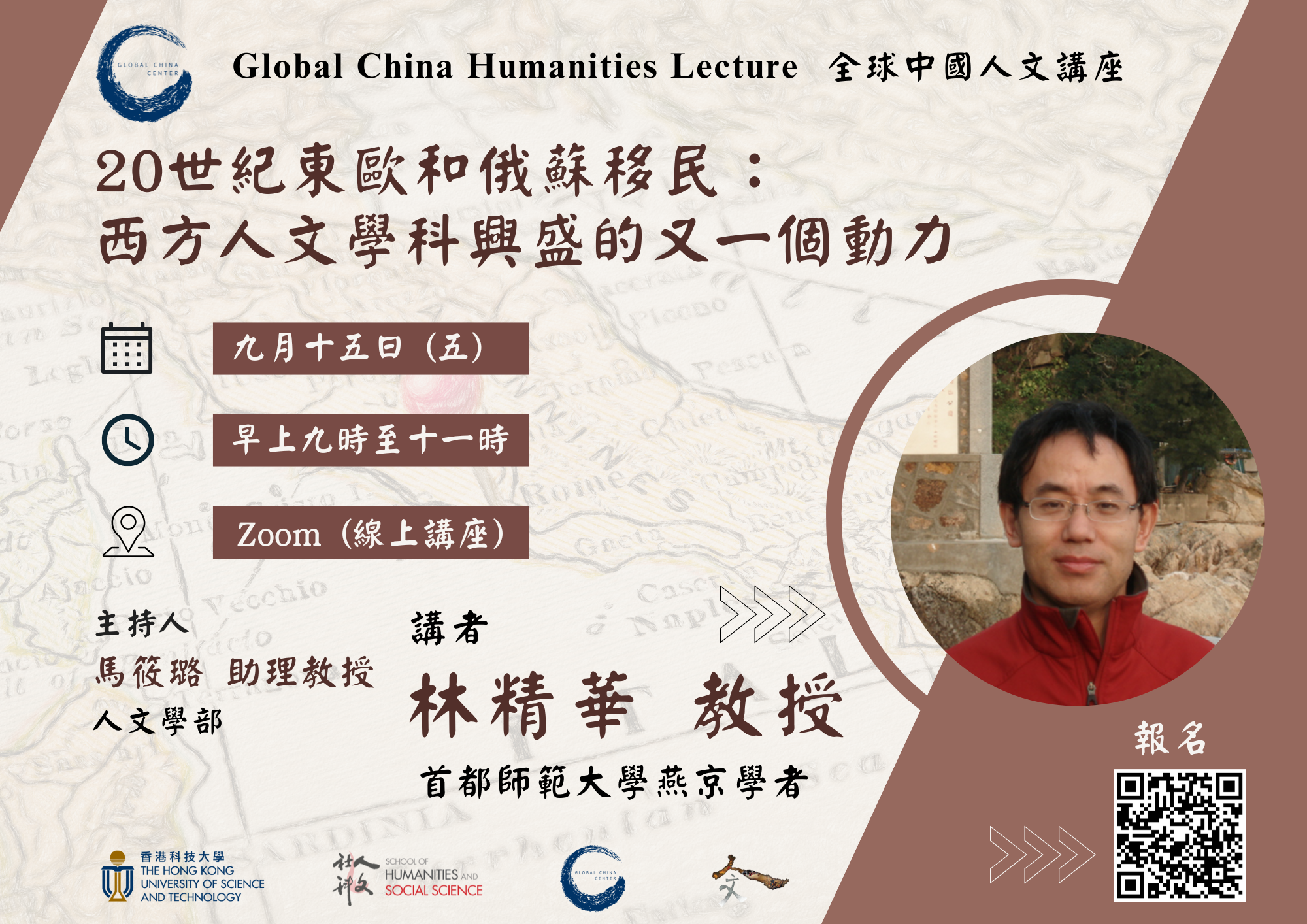A poster for a Chinese high-speed train at the construction site for a bridge over the Mekong River in Laos
Upcoming Events
Past Events
H. G. Wells in search of China: Chinese intellectuals and the making of a universal history, 1919-1935
Room 3401 (Lift 2 / Lift 17-18)
The Outline of History by the English writer H. G. Wells (1866-1946), first published in 1920, was a bestseller and a cultural phenomenon during the interwar period. As a disciple of Thomas Huxley and Darwinism, Wells narrates a universal history from the origin and evolution of life and mankind to the aftermath of the Great War. The popularity of the Outline was not only a Western phenomenon. It also received widespread attention and popularity among Chinese readers. Although Wells had never been to China, he acquainted and interacted with several Chinese intellectuals, including Liang Qichao, Ding Wenjiang, Fu Ssunien and Chen Yuan, during his writing. They criticized, helped, and influenced Wells’s writing about China in the bestseller. In this presentation, I will use archival materials from the University of Illinois Library collections, such as correspondence between Chinese intellectuals and Wells, to reconstruct the details of interactions between Wells and his Chinese friends. They also reveal Well’s evolutionary epic of human history and cultural legacy in a wider global context. READ MORE...
現代中國留美學人歷史研究 & 第三次留美回國浪潮
3401室 (2號/ 17-18號電梯)
在中國現代留學歷史上,二十世紀1950年代存在著兩個趨向:留美歸國與走向蘇聯;在1970年代末期,重啓留學運動成為改革開放的重要起點和標誌,特別是到美國留學成為主要趨向。留學史是理解中國近現代歷史變遷的重要鎖鑰,是理解中國社會、政治、經濟與文化變革的獨特視角;留學生是中國現代化的基本推動力量,對於推進知識流動、國際交流與文化溝通有著獨特的作用。 中國近現代留學歷史研究中,特別是對1930年代以來留學美國的研究,佔據了重要位置。這次報告將闡述留美浪潮的分期和留學生的分類,概述五次留美浪潮,敘述第三次留美浪潮的出洋和回國的歷史,介紹廣義留學的非學位留學,包括工程技術人員赴美實習受訓,軍人赴美培訓參戰技術技能的情況,展示留美學生在美國的學習生活史料,回溯留學生回國後對建設中國的貢獻,論述歸國或移民與家國情懷的關係。 READ MORE...
日記美學:日常敘事的技術含量
Zoom
文學史往往充斥著偏見。它們的最大偏見是,大書特書虛構文學,淡然漠視紀實文學。詩歌、戲劇、小說,一統天下,儼然正統;傳記、遊記、日記,打入冷宮,不見天日。虛構文學主打的文學史,充其量只能算半部文學史。日記美學,試圖糾偏,將探討日常敘事的技術含量,以期匡正傳統的文學史觀。講座的剖析文本為蒲寧、胡適、吳宓等人的日記,特別聚焦其中的敘事特征與美學價值。 READ MORE...
中國影像史的全球文獻匯集與研究
1104室 (LT-A旁)
講座將介紹中國攝影史和關於中國的影像所涉及的文獻在世界範圍內的分布、研究的進展與方法,中國攝影的美術館館藏的建立方式和研究性策展在這一計劃中所發揮的作用。 READ MORE...
“我們身處兩個世界中間”:1920-1940年代哈爾濱俄僑作家的“思鄉病”
Zoom
1910年在哈爾濱出生、後來成為詩人和記者的哈因德羅娃在回憶錄中寫過這樣的話:“我們身處兩個世界中間。哈爾濱是個中國城市。哈爾濱依舊是個舊制的俄羅斯城市。關於它可以說‘這里的精神是俄羅斯的精神,散發著羅斯的味道’。”這段話在很大程度上概括了“俄羅斯的哈爾濱人”或曰“哈爾濱的俄羅斯人”普遍的感受。“兩個世界”與其說是哈爾濱與俄羅斯,不如說是羅斯與十月革命之後的俄羅斯,或只是羅斯與俄羅斯。當時哈爾濱影響力最大、名稱源自以舊禮儀派信徒的生活為核心內容的多卷本長篇小說《丘拉耶夫家族》的文學團體“丘拉耶夫卡”,涅斯梅洛夫、阿恰伊爾、考洛索娃、卡拉塔羅夫等人的詩歌,民族志學家施庫林的紀實小說集《紅胡子》《賭徒》,這些文學事件和藝術創作折射出的皆是對“失去的天堂”深深的懷念與悲傷,以及對重返羅斯故鄉的渴望。哈爾濱俄僑作家的一個突出特點是幾乎所有人發表作品時使用的都是筆名,這其中寄托著對別樣生活的一種想象和實踐,因為新的名字寓意著新的身份,新的生命,新的命運。 READ MORE...
飄洋過海:“國際寫作計畫”(IWP), 中國創意寫作學科和世界文學 The Transpacific Flow: “The International Writing Program (IWP),” Creative Writing Programs in China, and World Literature
國際寫作計劃(IWP)於1967年由美國詩人保羅安格爾與華裔小說家聶華苓在美國愛荷華大學共同創立。從1979至2019年,IWP共邀請了57名中國大陸作家“駐站”訪問。包括王安憶、莫言在內的一批當代作家通過IWP的平台感受美國文化,了解世界文學,探索個人身份,揣摩寫作技藝,甚至學習創意寫作的教學。中國文學與世界文學在IWP的曲折初遇為他們日後的個人創作及在中國大學建設創意寫作學科提供了靈感。總之,他們的作品和經歷都證明,中西之間的文化交流是動態、多向的。作為文學交流乃至文化外交的工具,“翻譯”成就了在特定的在地語境中,地域政治、經濟文化、個人動能等諸多因素對西方概念、敘事模式和文化機構的改編和重寫。 READ MORE...
攜帶著詩歌返回俄羅斯—二十世紀俄羅斯僑民詩歌漫談
二十世紀,俄羅斯最具世界性影響的文學現象,或許就是僑民詩歌(或稱“流亡”文學)。自二十年代至七十年代,一大批僑民詩人繼承了自普希金至“白銀時代”文學的優秀傳統,在異國他鄉堅持母語寫作,強大了令人矚目的文學成績。他們因著家園的喪失,疊加了人類的精神失重感,以獨特的詩歌語言,嫻熟的藝術技巧,使自己的作品具體地象征了“內心流亡”的內涵,展示了豐富的想象力和現代人的精神困境,成為二十世紀最具存在論意味的詩歌風景。 READ MORE...
身體作為政治與情感動員的手段在新聞和宣傳之間的宋教仁肖像照片
通過對1913年由國民黨人策劃的宋教仁遺體照片的生產、使用和流通過程的詳細解讀,呈現了國民黨人在新聞與宣傳實踐中展開的各種嘗試、努力和挑戰。在今天看來,這些舉動既是發揮攝影作為彼時先進視覺傳播手段的嘗試,也是克服新聞攝影的局限以及擴大新聞攝影的動員能力的努力。 READ MORE...
布羅茨基的雙語寫作
布羅茨基作為一位俄裔美國詩人,其寫作的最顯明特征之一即雙語寫作,他用俄語寫詩,用英語寫散文,英俄兩種語言是他觀察世界的兩種方式,反過來,這兩種語言及其相互關系也為他的創作提供了源源不斷的張力和動力。 READ MORE...
20世紀東歐和俄蘇移民: 西方人文學科興盛的又一個動力
十月革命之後,二戰到來之前,解凍思潮之後,新思維改革以降,先後開啟四波俄國和東歐移民西方浪潮,移民中有著大量的專業學者、文學藝術家,他們在西方,尤其是在美國的大學獲得重要的學術職位,利用大西洋兩岸各大學的條件優厚的學院制度,在語言學、文學批評、斯拉夫文學和哲學等,做出了巨大貢獻,從而推動人文學科飛速發展。 READ MORE...

